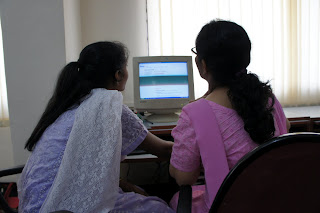Learning in Open Online Courses
Learning is becoming more complex, or so, it seems. Depending on how one looks at learning, it could be done in a very formal structured way ("traditional") vs a somewhat informal unstructured way ("new").
I think some students in higher education institutions are going through some very challenging times. On the one hand, they are so used to learning the JIT way which is any which way that works at a particular moment in time. It could be through any ICT device or any print media; but more likely the former, where one can quickly look up for information. Typically, information would best come from Twitter or RSS feeds or FB posts, in fact, more so than from structured or well-designed web sites or portals.
The minds of individuals, especially those of the young, work differently than those who are more matured. Perhaps they have been wired differently. Or, perhaps the way their minds function is a result of their environment, which can be described as chaotic. Life isn't as simple or straightforward like it was in the 50s, 60s, 70s or 80s.
Somehow, with the birth of play stations and similar devices in the 90s, the young children of that time had a lot of control within their little hands. They quickly learnt how to strategise when playing the games or when they role played in the many simulation games that were created for PCs. Perhaps, their brains became wired for more complex situations and those that called for quick decisions based on multiple strategies or analyses of multiple situations. So, imagine after all that, having to sit still in a formal classroom, listening to lecture after lecture and reading what were prescribed became somewhat "unrealistic."
How about if students today were given a range of alternatives in which to "pull" from for their learning? Of course, this gives rise to a different sort of way to assess their learning.
Roughly, about 30 percent of those taking a higher education course are taking them online. Another set of statistics, also indicate that some 30 percent of Internet users have smart phones. I wonder if these 30 percent are also those who are learning through a self-organised manner? What do you think?
George Siemens's slides on the latter are below:
I think some students in higher education institutions are going through some very challenging times. On the one hand, they are so used to learning the JIT way which is any which way that works at a particular moment in time. It could be through any ICT device or any print media; but more likely the former, where one can quickly look up for information. Typically, information would best come from Twitter or RSS feeds or FB posts, in fact, more so than from structured or well-designed web sites or portals.
The minds of individuals, especially those of the young, work differently than those who are more matured. Perhaps they have been wired differently. Or, perhaps the way their minds function is a result of their environment, which can be described as chaotic. Life isn't as simple or straightforward like it was in the 50s, 60s, 70s or 80s.
Somehow, with the birth of play stations and similar devices in the 90s, the young children of that time had a lot of control within their little hands. They quickly learnt how to strategise when playing the games or when they role played in the many simulation games that were created for PCs. Perhaps, their brains became wired for more complex situations and those that called for quick decisions based on multiple strategies or analyses of multiple situations. So, imagine after all that, having to sit still in a formal classroom, listening to lecture after lecture and reading what were prescribed became somewhat "unrealistic."
How about if students today were given a range of alternatives in which to "pull" from for their learning? Of course, this gives rise to a different sort of way to assess their learning.
Roughly, about 30 percent of those taking a higher education course are taking them online. Another set of statistics, also indicate that some 30 percent of Internet users have smart phones. I wonder if these 30 percent are also those who are learning through a self-organised manner? What do you think?
George Siemens's slides on the latter are below:
Self-Organization in Open Online Courses
View more presentations from gsiemens

Comments